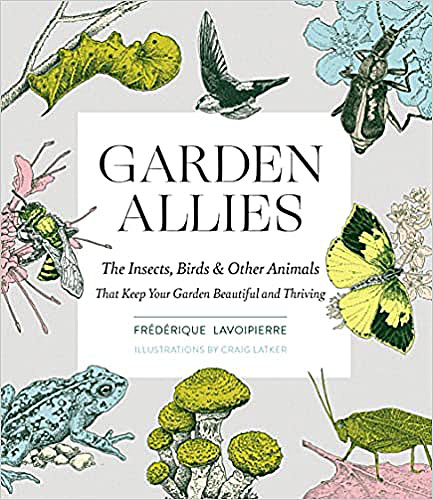Who’s Who in the Garden: Beyond Pollinators
By George Graine, Fairfax Master Gardener
“A garden is a grand teacher. It teaches patience and careful watchfulness; it teaches industry and thrift; above all, it teaches entire trust.”
— Gertrude Jekyll (1843-1932)
 In the preface to a new book “Garden Allies: The Insects, Birds & Other Animals That Keep Your Garden Beautiful and Thriving” by Frederique Lavoipierre (Timber Press, 2021), she writes “ . . . they are inextricable in the world we all share.” Also included are more than 100 intricate, instructive black pen and ink illustrations by Craig Latker. The introductory sentence of the book and paragraphs that follow set the stage and lead you to many inhabitants of gardens. The first words are “Above, under, around, within, and beyond your plants, your garden is a constantly changing complex of connections.”
In the preface to a new book “Garden Allies: The Insects, Birds & Other Animals That Keep Your Garden Beautiful and Thriving” by Frederique Lavoipierre (Timber Press, 2021), she writes “ . . . they are inextricable in the world we all share.” Also included are more than 100 intricate, instructive black pen and ink illustrations by Craig Latker. The introductory sentence of the book and paragraphs that follow set the stage and lead you to many inhabitants of gardens. The first words are “Above, under, around, within, and beyond your plants, your garden is a constantly changing complex of connections.”
There are several reasons why this book should be an important addition to your horticultural library. It will help you to know and understand the actors that are on your garden stage, and you will explore ecological concepts of nature versus those that are introduced. This is a key consideration regarding biological control because insects and other creatures are very fussy, especially when it comes to visiting flowers, seeds and other tasty morsels. To be sure, your garden habitat is a key to pest management. This type of control even has an impact on birds that feed insects to their young.
The best method of insect control should be one that has the least environmental impact to avoid unintended repercussions. Ideally, the author asserts that “A resilient, self-regulating garden is a worthy goal.” Here is a thought for those with a severe killer instinct. As an example, you have an infestation of aphids (a fairly common bug). While they are not as “bad” when compared to some other insects, they are a major food source for lady bugs especially those in the nymph stage. The question is: Can you imagine a world without lady bugs? Why not take a different approach to some of the many inhabitants of our gardens. Instead of kill-kill, accept these creatures as part of the overall ecosystem. In other words, that means our job as gardeners, regardless of ability, is to create an ally with good bugs and other inhabitants. Note that squirrels, chipmunks, rabbits, deer, raccoons and poisonous snakes are not included as allies for more than obvious reasons.
It is fair and accurate to note that the majority of pages in “Garden Allies” are concentrated on insects. This is not unreasonable because they are the root of many garden problems. Later in the text you will leave bugs and learn about microscopic decomposers, nitrogen fixers et al, and finally read about slugs and snails. To be sure, some gardeners get the “yips” about them, especially “hostaholics.” On the other hand, they are important in the overall consideration of the food web. Birds, snakes and amphibians, such as frogs, like to dine on these creatures. As an aside, remember that the French (and others) have been eating escargot for centuries.
The final pages of the book include many allies aside from insects. Although they are fewer in numbers, they, too, are your garden allies and should not be feared. These include toads, frogs (noted above) and salamanders. Snakes are also allies (excluding copperheads or other poisonous snakes) as are lizards and skinks. Of course there is a section on birds including woodpeckers, hummingbirds and many others. By the way, there is a section on bats, the champions of insectivores. They can eat up to 3,000 insects per night! Is a bat box in your future? Hang one high up on a tree.
The epilogue in the book is about why gardening matters. Lavoipierre writes “ . . . the more natural enemies you have in your garden, the better pest population will be regulated.” In other words, with fewer pests, you will be less likely to reach for a spray can. Is it time to throw away that can of pesticide? And in summary, think of this book as a gardening reward. It will supply you with much beauty of nature that perhaps you had not considered before.